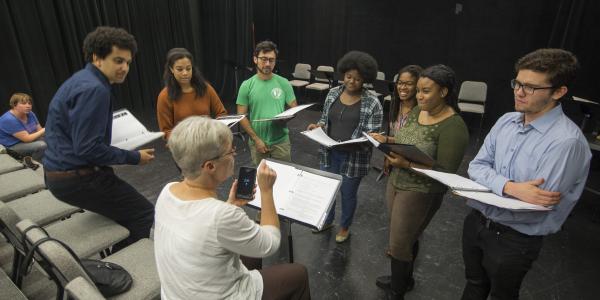Andie Berry, a senior in English Literature and winner of the 2017 annual A.E. Hotchner Playwriting Festival talks about her winning play “Son of Soil” and her writing process:
What drew you to playwriting?
I generally identify as a writer, and I came to playwriting as a form of writing rather than being drawn to acting. I think I’m drawn to drama and playwriting because for however long the play lasts, there is an intimate community between the actors and the audience. Knowing I created that space is a wonderful experience. But reaching that moment can be difficult because I switch between literary genres depending on the story I want to tell. I can sometimes write a play that develops more like a novel or should actually be a poem. I like my work best when I can hit a balance between these different ways to tell a story.

Tell me about “Son of Soil.” What’s the story of the play? What inspired you to write it?
“Son of Soil” is a glimpse into a town that has experienced great division and tragedy within the space of two generations. When the play starts, the town is on the knife’s edge of two choices: either the people can choose to fall into painful segregation or they can commit to a slow path of healing. But also, “Son of Soil” is a story about two women trying to find family after great loss.
I don’t think I could have written the play if I was not in St. Louis, as it is inspired by my experience as a black woman as well as the events that have transpired around St. Louis over the last few years — including the death of Michael Brown and the way in which Ferguson was thrown into a national spotlight that hasn’t quite subsided. My ultimate desire for the play is that the audience feels hope — and that doesn’t necessarily mean that there is a happy ending but that there is the possibility of happiness.
I know you are involved with WUslam. How does writing drama differ from writing prose or poetry?
Hearing my work aloud is a strange experience. When I heard the script read aloud for the first time, I realized that the characters, although fictional, are people with dreams and disappointments and history. On some level, I already knew that but I’d forgotten. It shocked me. And now, I have to remember to honor the people I have created just as I would honor anyone who was alive.
What have you drawn from the Hotchner experience?
This Hotchner experience has taught me that good writing requires time. Lots of time. Usually, I write best and most creatively under deadline. For some reason, this story and experience is different. There is so much that I still want to change and question and revisit. Also, the Hotchner Festival revealed that for me writing is about entertaining people — making them smile, cry, laugh, or just pause. If I could do that for the rest of my life, I would feel quite accomplished.
Sponsored by the Performing Arts Department in Arts & Sciences, the festival is named for alumnus A.E. Hotchner, who famously bested Tennessee Williams in a campus playwriting competition. The festival is coordinated by Carter W. Lewis, playwright-in-residence. Dramaturg is Bridget Kathleen O’Leary, the associate artistic director at New Repertory Theatre in Watertown, Mass., and literary chair for the National New Play Network.
This interview was conducted by Avery Holmes and originally published in The Source.





